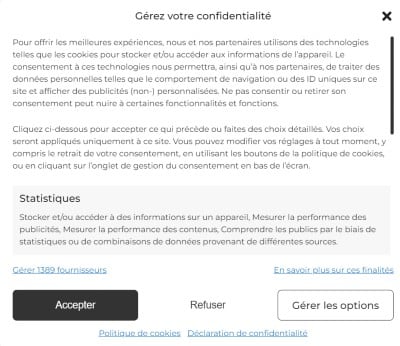Announced by Google for 2022, then postponed, the end of the cookies In the end, it will not take place in 2024. Postponed until 2025, it nevertheless heralds a breakthrough in digital practices that many companies are anticipating. But what exactly does this mean? What are the practical consequences for companies and their marketing teams? How can we prepare for the post-cookie third party era? Digital marketing expert David Lelièvre takes a look.

The deletion of third-party cookies from the Google Chrome browser is far from anecdotal. It marks a major turning point in the history of digital. The aim is to limit the possibilities for tracking by advertising companies. More than 70 % of digital marketers rely on third-party cookie data, mainly to track their advertising spend. A windfall estimated at 679.80 billion dollars in 2023 (according to Statista). The end of third-party cookies will force marketers to rethink their customer acquisition and loyalty strategies. It is up to them to find new ways of collect data and target their audiences.
What are third-party cookies?
The issue of deleting third-party cookies is linked to the protection of personal data. personal data individuals.
When a visitor logs on to a website, two types of cookies are used to collect information about their browsing behaviour:
- first-party cookies: data created and used solely by the website you are visiting to store your preferences, analyse and improve the user experience;
- secondly, cookies deposited by other partner sites (generally advertising sites), known as third-party cookies, which enable advertising retargeting or the attribution of conversions to advertising agencies, among other things.

What is information gathering?
- Information relating to user behaviour on the site: pages consulted, interactions with the site, traffic sources used, etc.
- Data deduced from the browser: geographical area, equipment used, etc.
What developments?
This information-gathering practice was the norm... until the introduction of the RGPD (General Data Protection Regulation) in 2018. This regulation requires prior consent Internet users for third-party cookies.
In other words, when you log on to a website, you must now be informed and give your permission for other parties than the website in question to collect information about your browsing.
This trend was confirmed in 2018, when Apple initiated the removal of third-party cookies with the launch of ITP (Intelligence Tracking Prevention). Firefox followed suit in 2019. On the other hand, Google, with its Chrome browser holding 70 % of market share, has not followed this trend, anxious to preserve its advertising interests with Google Ads.
Google has extended the life of third-party cookies.
What are the alternatives to third-party cookies?
Since then, Google has been trying to unite all the players in the market around new solutions. alternative solutions. Privacy SandboxFingerprinting (cohort targeting), Single sign-on (SSO)... all approaches that legislators are studying in minute detail to ensure that no technical gimmick can be used to circumvent the rules imposed by the RGPD. In short, a game of cat and mouse.
Alternative | Description | Benefits | Disadvantages |
First-party cookies | Cookies created by the visited site to store information about users. | Compliance with confidentiality rules. Improving the user experience on the site. | Limited to interactions on a single site. Less effective for cross-site ad tracking. |
Local storage | Data stored directly on the user's device via the browser. | Larger storage capacity than cookies. Not automatically sent to servers. | Less suitable for cross-site monitoring. More complicated access for third parties. |
Fingerprinting | Unique identification technique based on browser and hardware characteristics. | Works without local storage. Difficult for users to block. | Considered invasive of privacy. Strict regulations and ethical issues. |
Server to server (S2S) | Data exchange between servers without client intervention. | No dependency on browsers. Less likely to be blocked by users. | Complexity of implementation. Need for data sharing agreements between servers. |
Cohorts (FLoC, Topics) | Grouping of users according to their interests rather than individual follow-up. | More respectful of privacy. Useful for interest-based advertising targeting. | Loss of precision compared with third-party cookies. Varying acceptance by industry and regulators. |
Contextual tracking | Targeting based on the content of the page visited, without collecting user data. | No collection of personal data. Compatible with privacy regulations. | Less precise than user-based targeting. Variable effectiveness depending on content. |
Single sign-on (SSO) | Single authentication to access several services or applications (e.g. Okta). | Improved user experience. Centralised management and improved security. | Risk of centralised security breach. Complexity of implementation and management. |
What are the real consequences for companies?
The disappearance of third-party cookies will have a major impact on the advertising market.
This has two major consequences for companies and their marketing teams.
The precision of advertising targeting
In terms of digital campaigns, the first consequence is clearly the continuation of the reduction in the volume of available data. This has been shrinking steadily over the last ten years. It is estimated that after 2025, only 10 % of the digital data available in 2015 will still be available... which affects the accuracy and therefore the quality of advertising targeting (according to Atecna).
Thus certain practices such as retargeting are no longer accessible. In terms of settings, for example, it will no longer be possible to set limits on ad impressions (cap).
Measuring the impact of campaigns
The second consequence is that difficulty in tracking campaign performance. Attributing conversions to each advertising network or platform will be complex, unless you use techniques based on probabilistic calculations.
To sum up, the end of third-party cookies means :
- reduced precision of advertising targeting
- end of retargeting
- end of print limit measure
- difficulty in measuring conversions
How can companies adapt?
Should companies be preparing for a major upheaval with the end of third-party cookies?
As far as advertisers are concerned, the end of third-party cookies does not seem likely to bring about any major changes immediately. It is not a major concern at present, and companies are waiting for the technical solutions that will emerge after this new one-year postponement.
New solutions are already emerging. With regard to conversion analysis, the server-side tracking is a relevant solution. This method allows companies to reappropriate the data collected on their site, by capturing and internalising all browsing information, and then sharing it with their partners. However, this solution must always respect the consent of Internet users.
When it comes to advertising, despite Google's many delays, the players have no choice but to develop new solutions. Beyond hyper-contextualisation, the advertising market will eventually agree on a new targeting standard that complies with the RGPD.
In the meantime, it seems essential for companies to make better use of their first-party data. The priority: to capitalise more effectively on their own visits, for example by improving their data management strategies.
Furthermore, recent developments in digital marketing have reduced the importance of traditional media approaches. Whether it's influencer marketing, retail media or personalisation, there are many approaches that offer other ways of interacting with your targets.
A new approach to customer relations
Should we be worried about the end of third-party cookies? Certainly not. New techniques will compensate for the loss of information. Companies, for their part, will move towards greater transparency and respect for the privacy of Internet users.
At the end of the day, Internet users will have two questions to answer:
- Do you agree to share personal information to create value in our relationship?
- Do you agree that we share it with a few trusted partners to better serve you?
In short, it's a question of transparency, respect for privacy and a relationship based on trust. The end of third-party cookies represents an opportunity to envisage a new customer relationship.





